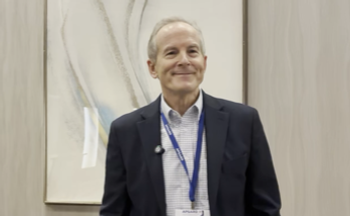
Lifestyle Psychiatry and the Totality of the Person: An Interview With the Outgoing APA President
Key Takeaways
- Lifestyle psychiatry is crucial for preventing premature death and improving mental and physical health, as emphasized by Viswanathan's personal experiences and professional focus.
- The current healthcare payment system inadequately values the long-term benefits of mental health interventions, necessitating systemic change.
Ramaswamy Viswanathan, MD, DrMedSc, emphasizes the vital role of lifestyle in mental health treatment and advocates for holistic approaches to prevent premature death at the 2025 APA Annual Meeting.
CONFERENCE REPORTER
Ramaswamy Viswanathan, MD, DrMedSc, is the outgoing President of the American Psychiatric Association (APA); a tenured professor and interim chair of Psychiatry, and director of C-L Psychiatry and C-L Psychiatry Fellowship at the State University of New York (SUNY) Downstate Health Sciences University. He is also board certified in psychiatry, internal medicine, consultation-liaison, geriatric, addiction and forensic psychiatry.
Viswanathan stopped in the press room at the 2025 APA Annual Meeting to talk to Psychiatric Times about his presidential theme and his thoughts on preventing premature death.
Psychiatric Times: You’ve been part of APA leadership for a while now, whether that was as Trustee of Minority and Under-Represented Groups on the APA Board, Chair of the Bylaws Committee, and as a longstanding representative in the APA Assembly. What’s been the most rewarding aspect of your presidency?
Ramaswamy Viswanathan, MD, DrMedSc: It has been quite rewarding educating people about the importance of incorporating lifestyle into all kinds of treatment they do, and also applying it to themselves. This provided me a platform to propagate and implement it, and it has been incredibly satisfying because lot of people have reached out to thank me for that. Many people said they specifically came to the meeting because of that. Also, I have been giving lectures internationally, and even people from other countries have written to me recently. Just 3 days ago, I got an email from somebody from South Korea. They were so impacted by the lecture I gave in Japan that he is actually spreading the message in South Korea. He has incorporated lifestyle psychiatry in his practice, and he is also forming groups to send the message to other clinics in different parts of South Korea. I also got responses from Papua New Guinea and the UK, both developed countries and developing countries. It's good to have such a big impact.
PT: Can you talk to me about how you selected your focus of Lifestyle Psychiatry for this year’s meeting? What other topics were in the running? Why didn’t you choose them?
Viswanathan: I have always been interested in prevention, right from my childhood, because I lost my father when I was 2 years old, He was only 42 years old, and he died of a heart sudden heart attack. And 2 of his brothers also died at an early age of a heart attack. So I was always interested in physical activity and nutrition as a way of preventing premature death. Then, as I began practicing and learning more, I also became interested in the other aspects of lifestyle, like sleep, social connectedness, stress management, and avoidance of risky substances. I was initially interested in prevention, and I think lifestyle is a major way to address that issue, because much of our disease burden, both in this country and the rest of the world, is attributable to things which can be modified by lifestyle.
PT: As a C-L psychiatrist, what’s the interplay between mental and physical health and how can lifestyle psychiatry improve outcomes?
Viswanathan: I'm glad you asked that! I do believe that all physicians should be interested in both the physical health and mental health—the totality of the person. They are not simply absence of disease. I also believe in positive health, and that is the reason that this year’s meeting theme is positive mental and physical health and optimal performance. As a C-L psychiatrist, we are always interested in both mind and body and the interactions. Luckily for us, many lifestyle factors enhance both physical health and mental health. And it is not simply by improving circulation to the brain. There are specific ways in which many lifestyle factors impact upon the brain.
PT: You have shared that your vision is “to advance science and practice without unnecessary intrusions by third-parties.” Can you speak about that?
Viswanathan: Unfortunately, our payment system was developed with certain procedures in mind. The insurance industry developed it mainly for costly surgical interventions, but now all kinds of medical treatment are covered. But the thing is, these insurance companies are short term focused and interested in big data. For whatever reason, many people are simply interested in containing costs. There are a lot of studies to show that for every dollar spent on mental health intervention, the return is $6. People's productivity improves and they can return to the workforce, but the insurance company does not see that benefit in the short term. So we have to really change the system of payment so that it takes that into account.
PT: This is the 40th anniversary of Psychiatric Times. Can you talk to me about what change you’d like to see in the field over the next 40 years?
Viswanathan: That's interesting. I want people to be focused not only on treating symptoms, but on improving the overall health of the individuals, both mental and physical health. Also there are some very serious disorders like autism spectrum disorder and schizophrenia and dementia. These exact such a formidable toll, and we do not have sufficient understanding of the mechanisms. I would like for us to make advances in understanding so that these conditions are easily diagnosed quite early on, or the predisposition is diagnosed early on, and then we can implement interventions to prevent the development of the disorders.
PT: Thank you!
Newsletter
Receive trusted psychiatric news, expert analysis, and clinical insights — subscribe today to support your practice and your patients.







